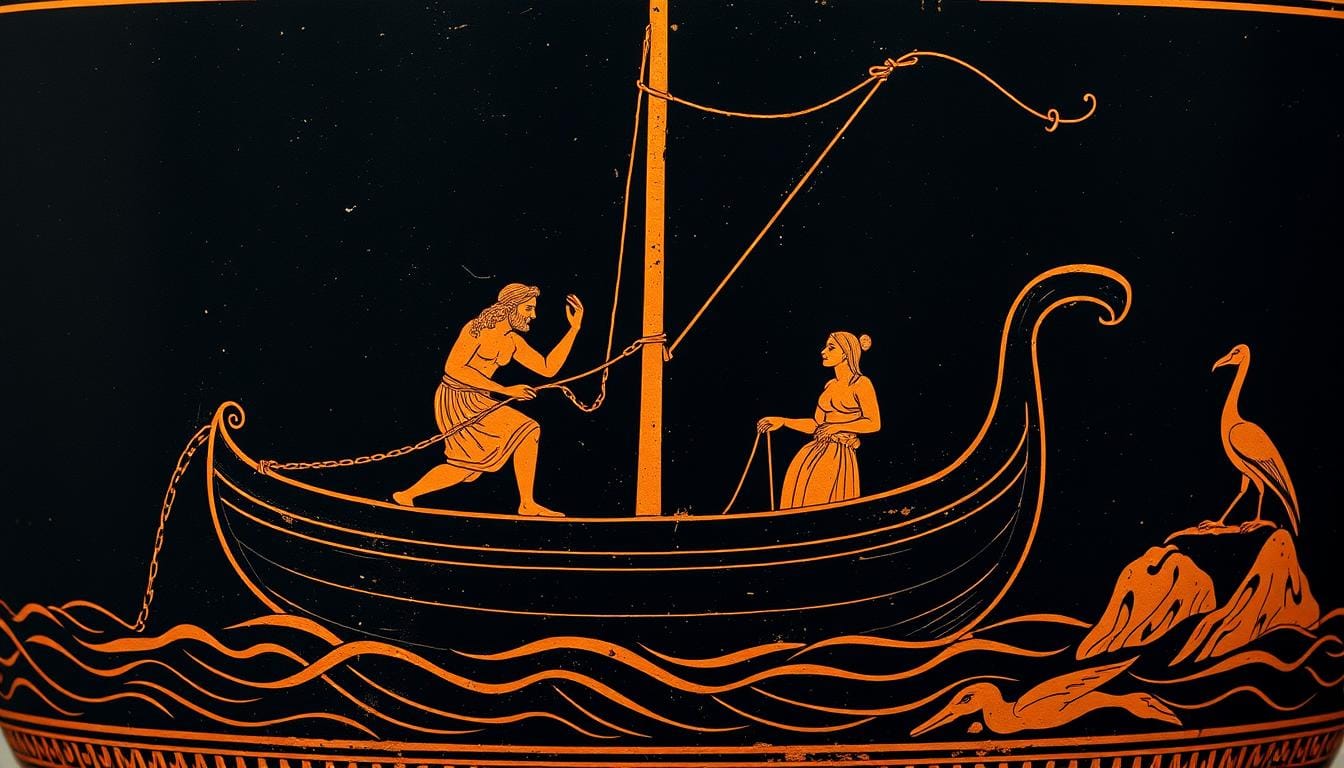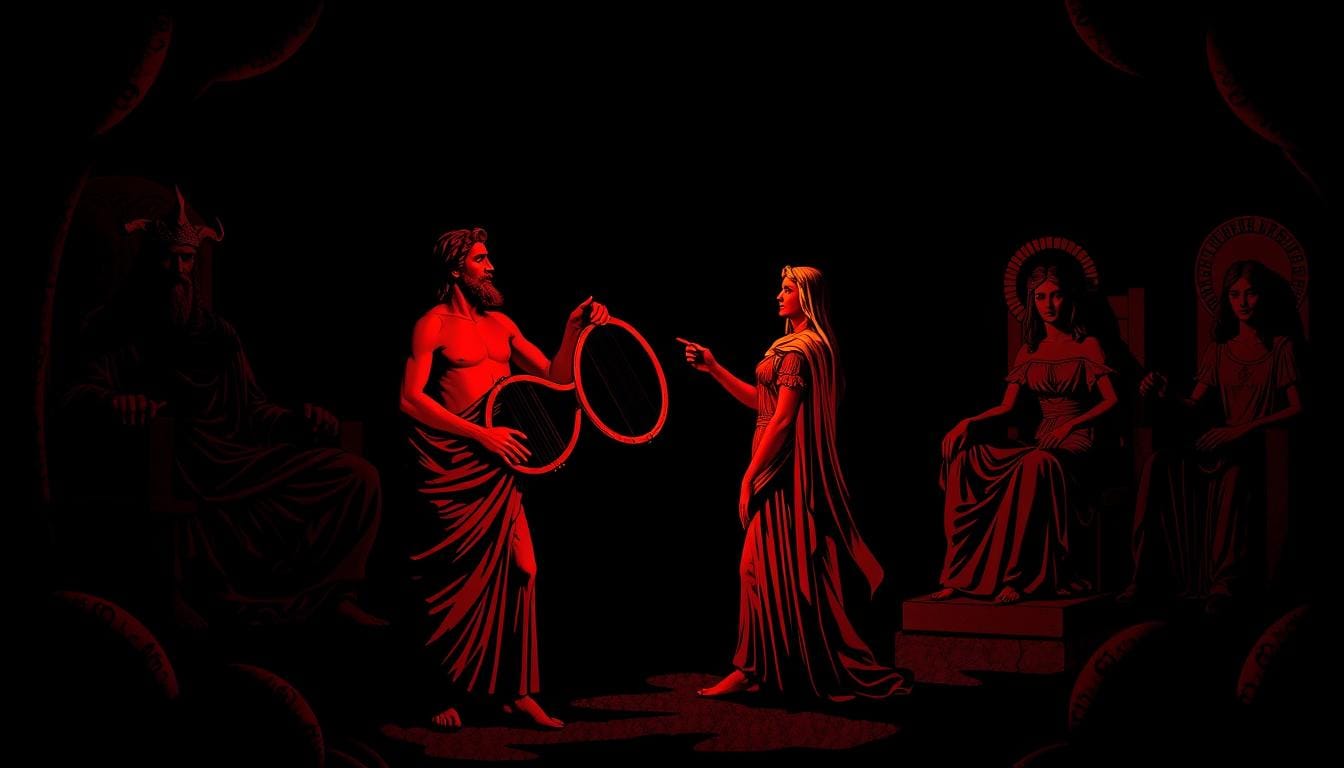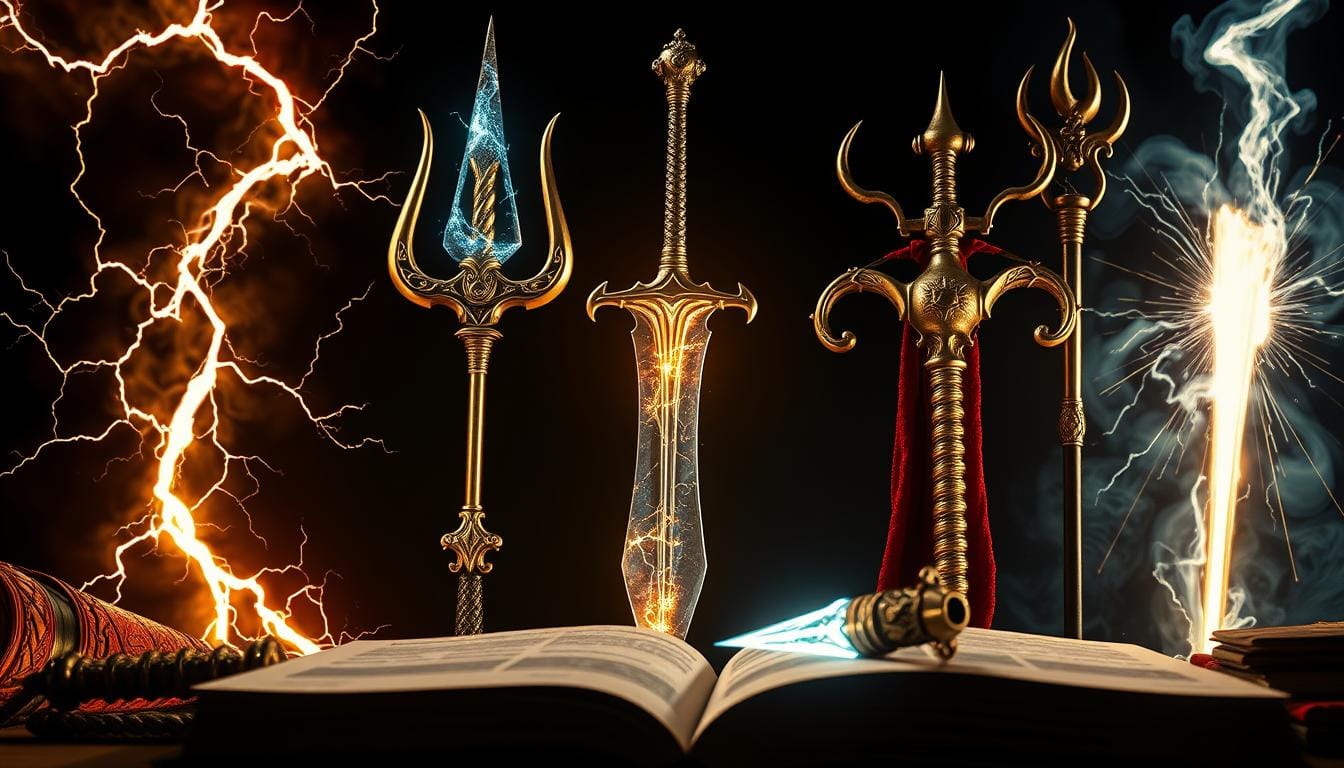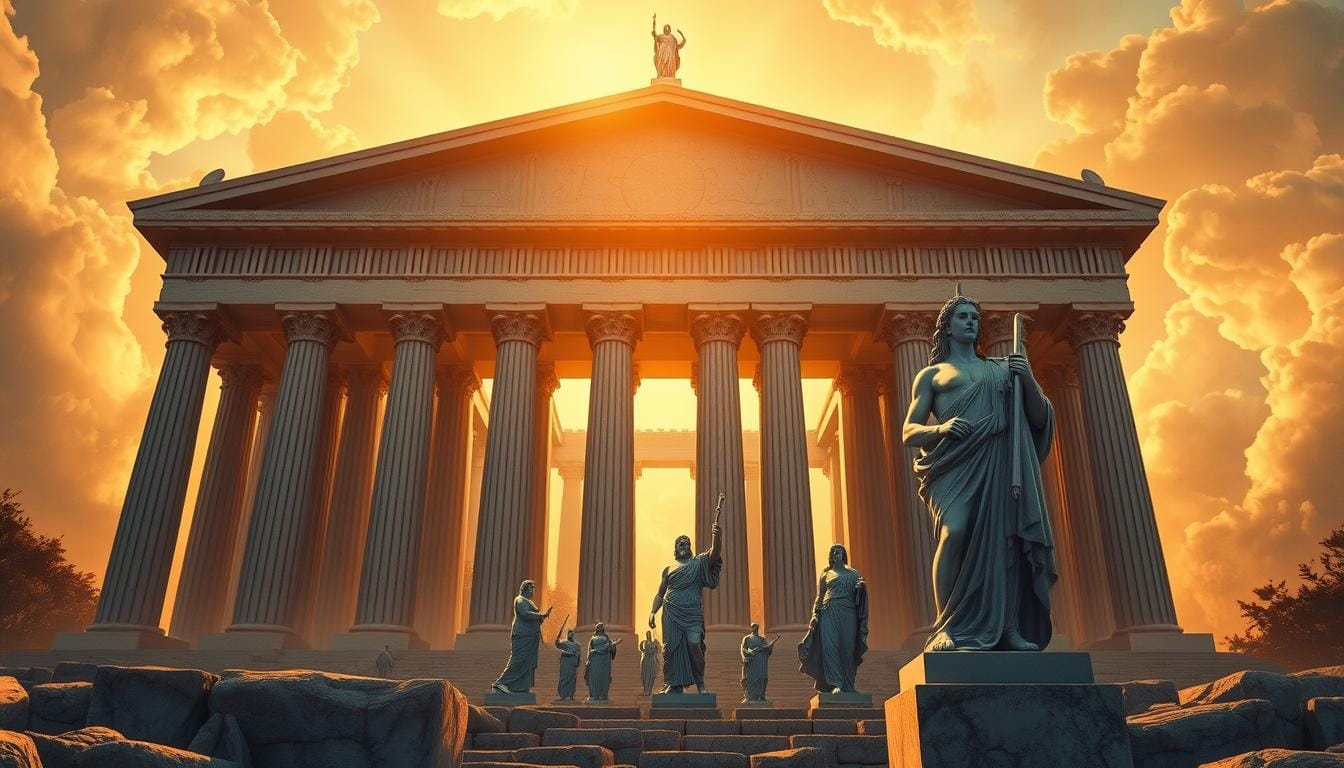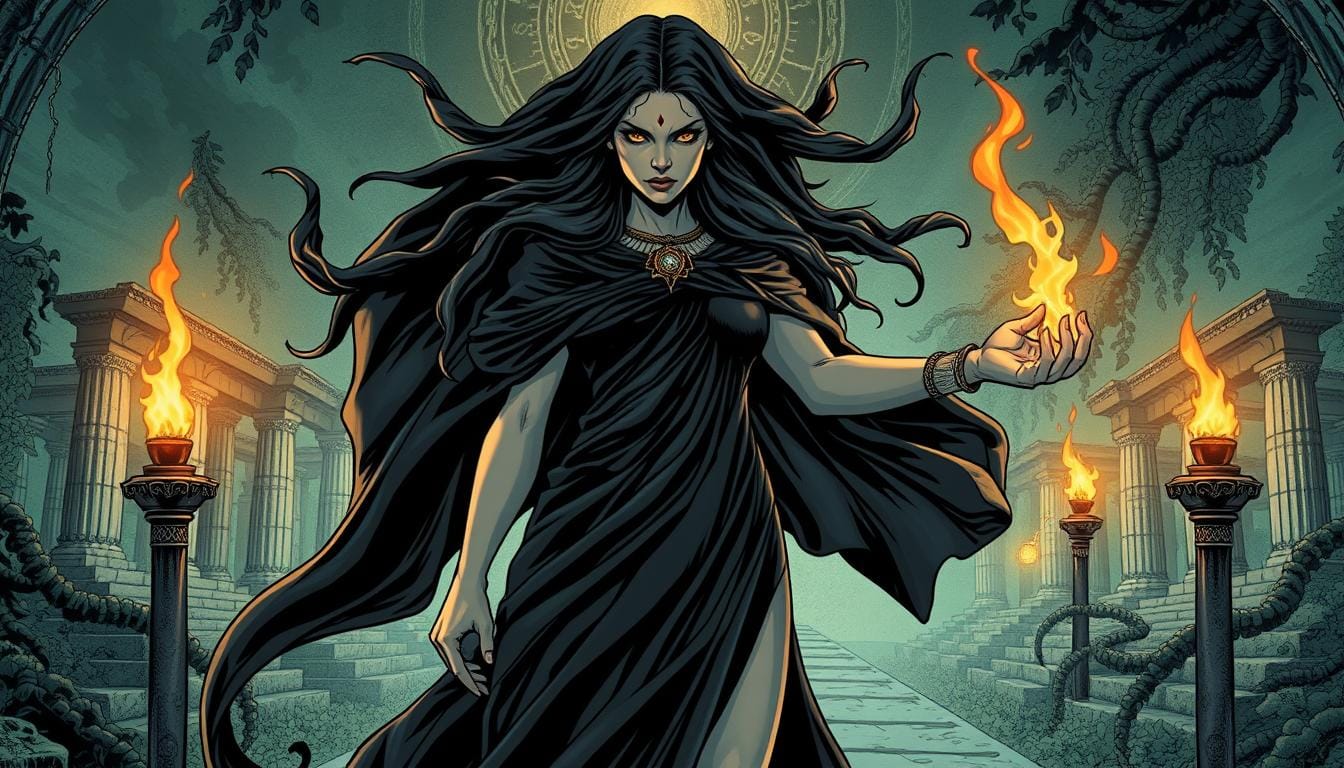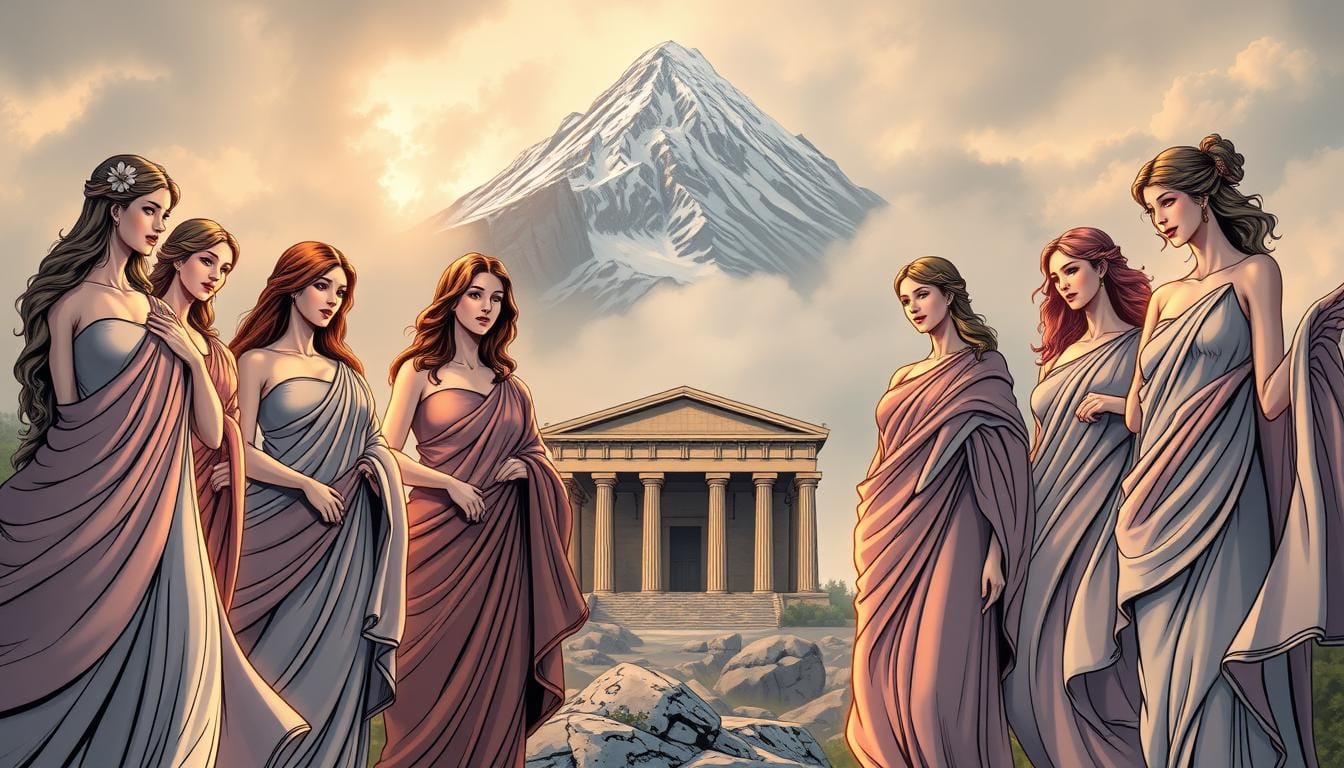Ares was one of the twelve Olympian gods, but he had fewer temples than almost any other major deity. This fact shows a fascinating paradox. It’s about the god of war in a society built on military conquest.
Ancient Greeks saw Ares with a mix of fear and reluctance. Unlike other gods, Ares was not widely worshiped. He represented the brutal, chaotic side of war. Even warrior societies wanted to keep him at a distance.
But, there’s more to Ares than his bloodthirsty reputation. Modern views often see him as just a warmonger. They miss the complex role he played in ancient beliefs about conflict, courage, and human nature.
This journey will reveal the true Ares. We’ll look at his relationships, symbols, and lasting impact on culture. Get ready to see why this misunderstood deity is more than his fierce exterior.
Key Takeaways
- Ares received fewer temples than other major Olympian gods despite ruling warfare
- Ancient Greeks feared his representation of chaotic, brutal combat
- His character extends beyond simple bloodlust to complex themes of courage
- Modern interpretations often oversimplify his mythological significance
- His relationships with other gods reveal deeper aspects of his personality
- Ares continues to influence contemporary culture and storytelling
Who is Ares in Greek Mythology?
If you crack open the poetic scrolls left by ancient Greeks, you’ll see a far richer—and sometimes contradictory—Ares than his pop-culture “war for war’s sake” reputation suggests.
The Hymns paint Ares as the ultimate force of war:
- He is called “unconquered,” “bronze-clad,” and “saviour of cities.” The Greeks didn’t deny his strategic importance—Ares could topple mighty walls, scatter armies, and spin the chaos of battle with unmatched energy.
- Yet he is not only about bloodlust. Hymnists sometimes pleaded with him for bravery, justice, and the strength to fight only necessary battles—not just to stir up bedlam.
Ares’ influence had two sharp edges:
- He inspired warriors to courage and action, making him a patron for anyone needing a little backbone before the clash.
- On the flip side, poets often begged him to restrain rash fury and help mortals choose peace when possible—requesting he swap the sound of swords for a bit of tranquility (ideally with the help of Aphrodite and Dionysus when the war drums quieted).
In short, ancient hymns reveal a god capable of both terrible destruction and, at times, reluctant peacemaking. Ares was summoned not just to unleash violence, but to help mortals manage it—or even overcome it—reminding us that even the god of War was called upon to promote a little harmony on occasion.
Origins and Parentage
Ares was born from Zeus and Hera, making him a powerful Olympian god from the start. But his relationship with his parents was far from perfect.
Zeus had mixed feelings about Ares. The Spanish song reference captures this perfectly: “Zeus engendró a un dios sin corazón” (Zeus begot a god without a heart). This phrase highlights how even Zeus viewed Ares as lacking compassion and mercy.
“Of all the gods who hold Olympus, you are most hateful to me, for always strife is dear to you and wars and battles.”
Hera, Ares’ mother, also struggled with his violent nature. Some myths say she sent him away from Olympus during his youth because of his aggressive behavior. This early rejection shaped Ares into a deity who sought approval through displays of strength and warfare.
Physical Appearance
Ancient Greek artists and poets described Ares as the perfect warrior in physical form. He had an imposing figure that struck fear into enemies and inspired confidence in allies. His muscular build reflected his role as the God of War.
Classical depictions show Ares with powerful chest muscles and a commanding presence on the battlefield. He wore gleaming bronze armor that caught the light of battle fires. His helmet, often adorned with horsehair plumes, added to his intimidating appearance.
The god carried a gigantic spear that became his signature weapon. This massive weapon could pierce through multiple enemies at once, demonstrating his supernatural strength. His shield bore designs that told stories of famous battles and victories.
Ares’ eyes were said to burn with the fire of conflict. When he entered battle, his appearance became even more terrifying. His armor would gleam brighter, and his voice would boom across battlefields like thunder.
Symbolism and Attributes
The symbols associated with Ares revealed the complex nature of warfare in ancient Greek culture. Each attribute carried deep meaning about conflict, courage, and the consequences of battle.
His primary symbols included the spear and shield, representing offensive and defensive aspects of war. The spear symbolized aggression and the drive to attack, while the shield represented protection and strategic defense. Together, they showed that successful warfare required both elements.
Sacred animals connected to Ares included the vulture and the dog. Vultures followed armies to feast on fallen soldiers, making them natural symbols of war’s aftermath. Dogs represented loyalty in battle and the fierce protection warriors showed for their comrades.
The boar also served as one of Ares’ sacred animals. These creatures were known for their aggressive nature and willingness to fight when cornered. This connection emphasized the God of War’s association with courage in desperate situations.
Ares was further linked to the serpent, an animal steeped in symbolism. The serpent embodied both danger and guardianship, echoing the unpredictable outcomes of war. Certain birds, like the vulture and some species of owl, were also associated with Ares, as ancient augury interpreted these creatures as omens of conflict, sedition, and ill fortune.
In myth, two legendary serpents were especially tied to Ares. The Colchian Dragon, a monstrous serpent placed by Ares to guard the Golden Fleece, represented the god’s role as a fierce protector of prized possessions. Similarly, the Ismenian Dragon watched over a sacred spring near Thebes, reinforcing Ares’ connection to powerful, untamable guardians.
Through these symbols—both animal and artifact—Ares was portrayed as a god who embodied the many faces of war: its brutality, its loyalty, its unpredictability, and its moments of desperate valor.
Bronze and iron were metals sacred to Ares, reflecting the importance of weapons and armor in warfare. The color red became strongly associated with him, representing both the blood of battle and the passion that drove warriors to fight.
These symbols helped ancient Greeks understand that war involved more than just violence. Ares represented the full spectrum of conflict – from the initial courage needed to face danger to the final consequences of battle.
Ares' Roles and Responsibilities
Ares was a god of war, but not just any war. He was about the raw, chaotic parts of battle. Unlike gods like Athena, who focused on strategy, Ares was about the fury that could take over armies.
Despite living in a society deeply affected by war, Ares was not as central as other gods. This shows how ancient Greeks saw different kinds of conflict and war.
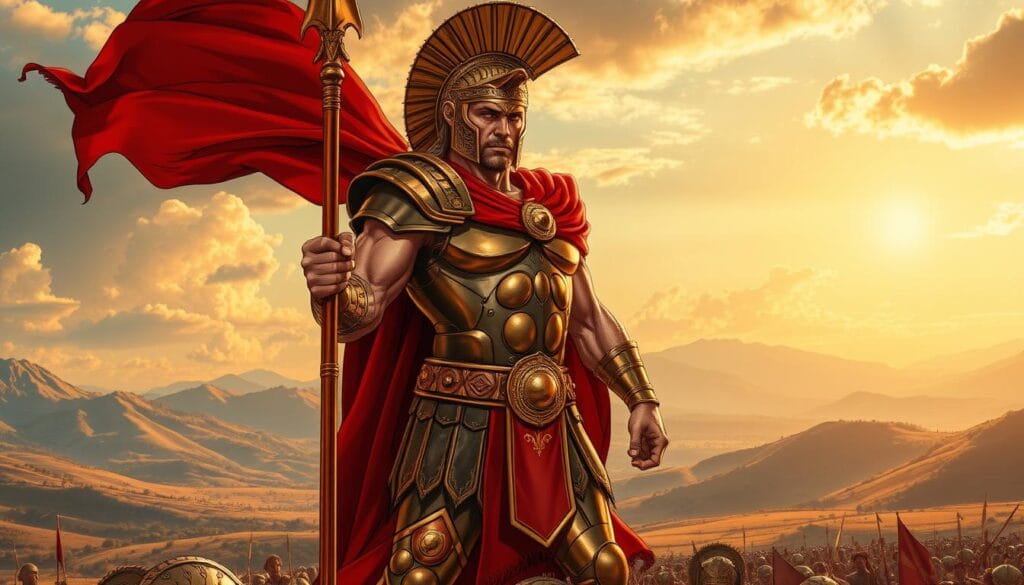
The God of War
Ares was all about the intense emotions of war. He was about bloodlust, chaos, and the violence that happens when rules are broken. This was different from Athena, who valued planning and strategy.
Warriors called on Ares for courage in battle. But his influence could also lead to reckless actions that could ruin a campaign.
The god’s power was seen in the frenzy of soldiers in battle. This rage could make soldiers fierce, but also hard to control.
Influence on Battle Strategies
Ares didn’t plan battles, but his spirit shaped how armies fought. He inspired the boldness needed for success in war. Commanders knew that without Ares’ spirit, even the best plans could fail.
Armies that honored Ares were known for their bravery. But they also faced the dangers of unchecked anger.
Ares’ influence was a double-edged sword. Armies blessed by him fought with unmatched courage, but sometimes lacked the discipline for complex battles.
Association with Conflict
The reach of Ares wasn’t limited to just the roar of battlefields. Ancient Greeks sometimes saw his destructive power at work even in the spread of plagues and epidemics. Just as Ares could unleash chaos in war, people believed he could fuel devastation during outbreaks of disease—turning illness into another form of conflict.
In the midst of a city gripped by sickness, it was not uncommon to imagine the god’s hand stirring up suffering and confusion. The suffering caused by plagues was likened to the chaos he brought to battlefields, with communities left feeling under siege by an invisible enemy. This perspective reminded people that conflict and destruction could surface anywhere, not just in the clash of swords.
| Domain | Ares’ Influence | Manifestation | Consequences |
|---|---|---|---|
| Battlefield Combat | Inspires battle fury | Warrior frenzy | Victory or reckless defeat |
| Personal Disputes | Escalates tensions | Heated arguments | Broken relationships |
| Civil Unrest | Fuels social discord | Riots and rebellion | Political instability |
| Military Strategy | Promotes aggression | Bold tactical moves | Unpredictable outcomes |
Ares was not as central in Greek culture as other gods. This shows their preference for strategic warfare over pure aggression. While Ares had great power, ancient Greeks valued victories won through discipline over those won by rage alone.
Notable Myths Involving Ares
In Greek mythology, Ares is known for his role as a battle deity. His stories show a paradox: he was both respected and often defeated. These tales from Ancient Greece show that even gods have limits.
These stories are more than just tales. They give us a peek into ancient views on war, love, and aggression. Each myth teaches us about pride, passion, and the costs of conflict.
The Trojan War
Ares was a key player in the Trojan War, but not always on the winning side. He fought for the Trojans, but his efforts were often thwarted. His involvement became a lesson in the dangers of divine interference in human battles.
During a key battle, Diomedes, with Athena’s help, wounded Ares. The god of war fled to Mount Olympus, leaving his allies behind. This event shocked both gods and mortals.
Zeus was unsympathetic to his son’s plight. He criticized Ares for his love of violence. This showed that even gods saw Ares’ war tactics as destructive.
Ares and Aphrodite
The affair between Ares and Aphrodite is one of mythology’s most scandalous tales. Aphrodite, the goddess of love, was married to Hephaestus. Yet, she was drawn to Ares’ passion and danger.
Their secret meetings were discovered by Helios, who told Hephaestus. Hephaestus then set a trap using invisible bronze chains.
When the lovers met again, they got caught in Hephaestus’ trap. Hephaestus invited all the gods to see their shame. The gods laughed at the trapped pair, turning their affair into public embarrassment.
“The gods burst into uncontrollable laughter at the sight of the two lovers caught in Hephaestus’ cunning trap.”
Ares' Defeats in Battle
Despite being a powerful battle deity, Ares suffered several defeats. These stories teach that strength alone doesn’t win battles.
The giant twins Otus and Ephialtes captured Ares and kept him in a bronze jar for thirteen months. Hermes freed him, leaving Ares weakened and humiliated.
Ares was also defeated by Athena during the Trojan War. Athena’s strategic thinking beat Ares’ raw aggression. This showed the power of planning over brute force.
- Imprisonment by giants: Trapped in bronze jar for over a year
- Defeat by Diomedes: Wounded and forced to retreat from Troy
- Humiliation by Athena: Outmaneuvered through superior strategy
- Public shame: Exposed affair brought ridicule from fellow gods
These defeats highlight a key theme in Ancient Greece mythology. They show that unchecked aggression and violence can lead to downfall. Ares’ failures warn against letting passion and anger control us.
The myths also explore the complex nature of human experiences. They mix love and war, strategy and force, pride and humility. Through Ares’ stories, ancient storytellers showed the full range of conflict and its outcomes.
Myths Explaining the Origins and Spread of Ares’ Worship
The origins of Ares’ worship, according to myths, stretch far beyond Greece’s familiar borders. Ancient stories placed Ares’ true home in wild, war-loving regions like Thrace and Scythia—lands often considered untamed and fierce by Greek standards. This connection gave Ares an exotic edge and helped explain why his worship seemed less at home in Greece’s city-states.
In these distant places, the myths recall, Ares received the kind of intense devotion that often crossed the line into fearsome. In Scythia, he wasn’t honored with statues or cities, but with a sword planted in the earth, symbolizing his pure, violent power. It’s said that rituals included sacrifices of animals—and, in chilling stories, even humans—to this divine weapon.
Myths also tell of sacred sites like Colchis, famed for the golden fleece. There, the fleece hung in an oak grove dedicated to Ares, deepening his connection to legendary quests and foreign lands. Other tales describe the famed twins, Castor and Pollux, bringing an ancient image of Ares from this region all the way to Laconia, hinting at how his worship was “imported” into Greece rather than homegrown.
Back in Greece, the spread of Ares’ worship never truly matched his larger-than-life reputation. He had a handful of shrines and temples—Athens boasted a temple featuring a statue made by the renowned sculptor Alcamenes, and Sparta kept a unique chained statue of Ares, symbolizing the city’s hope to “bind” war’s favor to their walls. Some places, such as Geronthrae, held annual festivals in Ares’ honor, though these were often marked by strict rules and even forbade women from entering the temple.
Interestingly, temples to Ares tended to appear on city outskirts rather than at the heart of the polis. This placement matched the Greek attitude: Ares was to be respected, invoked for protection, but always kept at arm’s length, as if to remind everyone of the dangerous force he represented.
According to the stories, much of Ares’ imagery and rituals flowed into Greece from Thrace, reinforcing his role as an outsider god imported from lands at the edge of the known world. He rarely appeared in art until the classical sculptor Alcamenes created a statue that set the standard for his image. Earlier poets and artists preferred to leave Ares to the imagination rather than bring his volatile presence into the calm, reasoned space of the Greek temple or home.
These myths show how Ares’ worship, unlike that of other major Olympians, felt both foreign and fearsome—originating in lands of perpetual conflict and brought into Greece with a sense of caution that lingered in every story and shrine.
Ares' Relationships with Other Gods
Ares, the Greek god of war, had some of the most complicated relationships with his family. His aggressive nature often clashed with the more strategic gods. This made his role in the pantheon and how mortals saw him very interesting.
His relationships were always tense and full of rivalry. Unlike Mars in Rome, Ares had trouble getting respect from his fellow gods. His family issues were deep and complex, going beyond simple sibling rivalry.
Ares’ Family: Gods, Siblings, and Offspring
Ares came into existence as the child of two of the most formidable figures in Greek mythology: Zeus and Hera, the king and queen atop Mount Olympus. That impressive pedigree also made him brother, and half-brother, to a host of famous Olympians—think Athena, Aphrodite, Apollo, Artemis, Hermes, Hephaestus, and Dionysus. With so many siblings, family gatherings must have been anything but dull.
Ares’ own legacy continued with the next generation, most notably through his passionate liaison with Aphrodite (yes, the goddess of love herself). Together, they had several children, each representing different aspects of conflict and harmony:
- Phobos (Fear)
- Deimos (Terror)
- Harmonia (Harmony)
Their daughter Harmonia became the mother of Semele—who, in turn, gave birth to Dionysus, the god of wine and revelry. So if you’re tracing godly connections, the family tree quickly turns into a sprawling tangle of legendary names and mythological drama.
But Ares’ influence didn’t stop with his divine children. He also fathered many mortal sons and daughters, usually with mortal women. True to their father’s reputation, many of these descendants were depicted as fierce warriors or even antagonists in myth, often finding themselves on the wrong side of legendary heroes.
Through both his godly and mortal lineage, Ares’ blend of chaos and courage continued to ripple through the stories and characters of ancient Greece.
Father and Son Tensions
Ares and his father Zeus had a strained relationship. Zeus was disappointed in Ares’ brutal ways and lack of strategy. This made Ares feel unwelcome among the other gods.
Zeus preferred Athena’s smart warfare tactics over Ares’ chaotic methods. During battles, Zeus backed Athena’s plans, ignoring Ares’ direct attacks. This showed the value of wisdom over power in Greek culture.
Despite being Zeus’ son, Ares felt overshadowed by his siblings. He was “often overshadowed by more famous siblings,” showing the complex family dynamics. This made him even more aggressive in trying to prove himself.
The Athena Rivalry
The rivalry between Ares and Athena was a key part of Greek mythology. They both dealt with war, but in very different ways. Athena was all about smart military tactics, while Ares was about raw chaos.
Ares often seemed less than Athena, despite his strength. Athena’s wins showed the Greeks valued intelligence over brute force. This rivalry taught them about the right way to go to war.
The Ares symbolism in these battles showed the Greeks’ views on aggression versus strategy. Athena’s wins taught them to value wisdom and planning over violence. Their battles were a lesson in how to conduct war.
Divine Conflicts and Alliances
Ares’ aggressive nature led to many conflicts with other gods. His affair with Aphrodite caused a big fight with Hephaestus, who trapped them. This made Ares look bad and entertained the other gods.
He also fought with Artemis over hunting grounds and disagreed with Apollo on divine intervention. These fights made him seem unpredictable and difficult to deal with.
The difference between Greek Ares and Roman Mars showed how cultures viewed war differently. Mars was respected as a protector, but Ares was seen as an outsider. This showed different views on war and leadership.
| Relationship | Nature of Conflict | Outcome | Cultural Significance |
|---|---|---|---|
| Zeus (Father) | Disappointment in brutal methods | Ongoing tension and disapproval | Wisdom over brute force |
| Athena (Half-sister) | Competing warfare philosophies | Athena’s consistent victories | Strategy defeats chaos |
| Hephaestus (Brother) | Rivalry over Aphrodite | Public humiliation for Ares | Consequences of adultery |
| Aphrodite (Lover) | Secret affair complications | Scandal and divine gossip | Love and war connection |
These divine relationships taught mortals about Ares symbolism in their lives. Ares’ struggles with family acceptance mirrored human feelings of being misunderstood. His complex relationships taught valuable lessons about wisdom, strategy, and proper conduct in war and family.
Worship and Temples Dedicated to Ares
Though Ares was a major figure in the Greek pantheon, his worship was surprisingly limited and scattered across the Greek world. You won’t find the grand temples and busy shrines that dotted the lands for Zeus or Athena—instead, worship of Ares was marked by select, sometimes peculiar, sites and practices.
Some notable places where Ares received honors include:
- Athens, where he did have a temple featuring a statue crafted by Alcamenes.
- Geronthrae in Laconia, known for its annual festival in his honor. Interestingly, during this festival, women were strictly forbidden from entering his temple, highlighting the exclusive and sometimes intimidating nature of his rites.
- Tegea and Olympia, where sanctuaries and lesser shrines stood as a nod to his influence.
- Near Thebes, with sites dedicated to him and rituals unique to that locality.
- Sparta, the city you’d expect to be his biggest fan. Sparta featured an ancient statue of Ares bound in chains, said to symbolize keeping the martial spirit and victory tied to the city forever. Some sources even mention grim human sacrifices made to appease Ares in Sparta—a rare and extreme practice even by Greek standards.
Ares’ temples were often tucked outside the main settlements, perhaps to signal that his might was best kept at the boundaries, guarding from and intimidating enemies rather than being woven into daily civic life.
His cult also carried echoes of northern lands, especially Thrace—known for its fierce warriors—where his worship may have first taken root before making its way into Greece. As for art and imagery, the Greeks were slow to give Ares a celebrated form. For a long time, he was more commonly seen on coins and engraved stones than in towering statues or detailed sculptures. It wasn’t until later artists like Alcamenes that a lasting ideal of Ares emerged in Greek art.
In short, Ares’ worship reflected the uneasy respect Greeks had for raw war—acknowledged, but always kept at arm’s length.
Sacred Sites and Religious Centers
The Areopagus in Athens was a famous site for Ares. It was where Ares faced trial for killing Poseidon’s son. This site became linked with justice, not war.
In ancient Greece, only a few temples were dedicated to Ares. Archaeology shows that most built small shrines instead of grand temples. This shows the cautious respect Greeks had for their war god.
Sparta, known for its military culture, surprisingly didn’t have much devotion to Ares. They honored their local war deities and heroes instead.
Ares’ Worship Beyond Greece
Ares wasn’t just a Greek story—he had a powerful presence far beyond Athens and Sparta. The god’s influence was especially strong in rougher northern regions like Thrace and Scythia, where warriors were known for their fierce reputation. Locals there saw Ares as their own and made him central to their way of life.
In Scythia, Ares’ worship looked very different than it did in Greek city-states. People honored him by using a sword as his symbol, and their rituals often included dramatic sacrifices, sometimes even involving animals and, in rare cases, humans. This showed their belief in Ares’ raw, untamed power—and their hope to channel it on the battlefield.
Over in Colchis—famous as the land of the Golden Fleece—Ares had sacred groves where the legendary fleece itself was displayed as an offering among the oak trees. Statues of Ares from this region traveled across borders, including to Laconia, where Spartan ceremonies incorporated them. Even the islands near Colchis, said to be home to the fearsome Stymphalian birds, were dedicated to him, with special rituals to honor his wild nature.
Ares also had connections in Egypt, though their “Ares” was a different local deity with a similar warlike energy. This Egyptian god had his own set of customs and rituals, blending local traditions with the idea of martial power.
All these unique forms of tribute reveal just how flexible and far-reaching Ares’ worship was. Each place focused on what mattered most to them—protection, raw strength, or wild courage—proving that Ares wasn’t just a Greek idea, but a universal symbol of war’s unpredictable nature.
Religious Celebrations and Sacred Festivals
The Areia festivals were the main celebrations for Ares. They happened in spring, when wars usually started. People offered sacrifices and performed rituals for protection in battles.
Rome’s festivals for Mars were much grander. They saw Mars as their war god and father. This led to big festivals like the Martius.
If you’re curious about the names:
- Greek Name: Αρης (Arês)
- Latin Spelling: Ares
- Roman Translation: Mars
So, while the Greeks called him Ares, the Romans embraced Mars as both a deity of war and a founding father, rolling out the red carpet (and probably a few chariots) in his honor.
Greek festivals were more subdued. They aimed to appease Ares, focusing on his protective side, not his destructive nature.
Hymns and Prayers Dedicated to Ares
Despite his mixed reputation, Ares was honored with hymns and prayers in ancient Greek literature. These written invocations reveal both awe and caution toward the god of war.
Homeric Hymns:
A well-known prayer to Ares appears in the ancient Homeric Hymns. In it, the poet appeals to Ares, praising him as a mighty warrior and protector of cities. The hymn requests not just battlefield prowess, but also help in overcoming fear and inner conflict. The petitioner asks Ares to guide them toward courage while restraining reckless anger, seeking help to find strength and peace—not just ferocity.
Orphic Hymns:
The Orphic Hymns provide another glimpse into Ares’ worship. These poems describe him as an unstoppable force, filled with energy and delighting in the roar of battle. Yet even here, the prayers often urge Ares to set aside conflict, to favor the fields (symbolizing peace and harvest) over arms, and to grant abundance rather than strife.
Together, these ancient hymns show that people asked Ares not only for strength in war, but also for his favor in bringing an end to violence. This duality—honoring both his destructive power and his ability to restore peace—was a central theme whenever the Greeks approached their formidable god of war.
Contemporary Remembrance and Cultural Practices
Today, Ares is remembered in various ways. Neo-pagan communities use his energy for courage and strength. These rituals focus on personal challenges, not war.
Military traditions worldwide honor war deities. Memorial services and veteran commemorations show the human need to find meaning in conflict and sacrifice.
Popular culture has brought Ares back into the spotlight through movies, books, and games. This has sparked discussions about war gods and human nature.
Ares in Literature and Art
Ancient Greek pottery depicts Ares in full armor, often with other gods or creatures. These works set visual traditions that lasted for centuries. Roman sculptures show him as a strong warrior, highlighting his physical strength.
Yet, despite his prominent place in mythology, Ares was not always a popular subject for early Greek artists. The most ancient poets described him as a figure whose character was difficult to capture in art, and in fact, artistic representations of Ares are rare before the time of Alcamenes, the sculptor credited with shaping the classic image of the god. Existing Greek monuments featuring Ares are few; he most often appears on coins, reliefs, and engraved gems rather than in large-scale statues or temples.
Across centuries, artists returned to Ares again and again. On Athenian red- and black-figure vases—from the 4th to 6th centuries B.C.—he appears in scenes with Aphrodite, Eros, and the Muses; feasting, kneeling beside Athena, or witnessing the birth of Athena herself. He joins the creation of Pandora, battles Giants and heroes like Heracles and Cadmus, and sits crowned with a wreath. Roman mosaics and wall frescoes from Pompeii and Antioch show Ares entwined with Aphrodite and Eros, or transformed as the boar that killed Adonis. Statues, whether marble or bronze, present him as Mars, the embodiment of military might.
Renaissance painters added emotional depth to his image. They captured moments of triumph and vulnerability. Artists like Botticelli showed him with Aphrodite, exploring love and war.
Through all these ages and mediums—vase, mosaic, fresco, sculpture, and canvas—Ares endures: armored and powerful, yet also a figure of mythic complexity.
His presence in art shows how societies see conflict and human nature. Artists use him to explore violence, courage, and war’s costs.
Descriptions of Ares in Ancient Texts
So, where did the vivid images of Ares come from in the first place? Greek and Roman authors didn’t leave us guessing when it came to describing the war god’s form and ferocity.
In Homer’s Iliad, Ares makes one of his earliest and most vivid appearances—not as a glorious hero, but as the most unpopular of the Olympians. While he’s technically the god of war, the way Homer paints him is far from flattering. He’s impulsive, often cowardly, and quick to flee when things get tough. In one scene, after being wounded, Ares lets out a scream so loud it’s said to echo like a thousand warriors crying out—and then runs to Zeus to complain, like a sulking child. Even the king of gods calls him alloprosallos, “the most changeful,” as if even Zeus is tired of his constant chaos.
And chaos is the word. Ares isn’t the calculating tactician like Athena, who represents strategy, wisdom, and the protection of cities. He’s the raw, destructive force of war—the clamor, the blood, the fear. He thrives in the noise and the madness, charging into battle without loyalty or foresight. Sometimes he fights for the Greeks, sometimes the Trojans. Often, he seems to just enjoy the fight itself.
Homer surrounds him with the personifications of war’s darkest elements: Fear (Deimos), Terror (Phobos), Strife (Eris)—even Plague. He’s like a walking storm of violence, followed by horrors that break armies and spirits alike.
And yet… he’s not invincible. Far from it. Ares is defeated, humiliated, even locked up. Diomedes wounds him (with Athena’s help, of course). Athena herself hurls him to the ground with a rock. The giant Aloadae imprisoned him for over a year, and only Hermes managed to rescue him. When Typhon threatened Olympus, Ares didn’t stand and fight—he turned into a fish and swam away.
Even Heracles—a mortal—managed to best him in battle.
Despite all this, Ares isn’t just a buffoonish brute. Later authors like Sophocles and Euripides offered him more dignity. They saw him not just as a destroyer, but as a necessary force. Harsh, yes—but part of the natural balance. War, after all, wasn’t always glorious. It was ugly, costly, and real.
And then there’s Ares the lover. His passionate affair with Aphrodite shows a more human side. He’s fiercely protective of her, jealous even—like when he took the form of a bear to kill Adonis. Their relationship was scandalous enough to land them in an embarrassing trap set by Hephaestus, but it adds depth to his character. He’s not just a machine of war—he feels, rages, burns.
In one fascinating myth, Ares is tried for murder on the Areopagus, a legendary hill in Athens that would later become the symbolic home of justice. Even the war god had to answer for bloodshed.
So where did this dramatic image of Ares come from? Ancient authors didn’t hold back. In the Iliad, he strides across the battlefield wielding a spear so large it makes even veteran warriors tremble. He’s towering, clad in golden armor, a glowing force in the artwork of Achilles’ shield. In Hesiod’s Shield of Heracles, Ares is seen blazing through the battlefield in a chariot, eyes like fire, armor that lights up the earth, flanked by his sons Deimos and Phobos.
Later writers went even bolder. Quintus Smyrnaeus describes Ares descending like a thunderbolt, his presence a storm—beautiful, yes, but terrifying. Gods and mortals alike would rather get out of his way than try to face him.
And that’s the paradox of Ares: feared and disrespected, brutal and passionate, unlikable yet essential. He wasn’t just the god of war—he was war itself. In all its ugliness, grandeur, noise, and flame.
Ares remains a god who divides opinion, much like war divides nations. Loved by few, understood by even fewer—but unforgettable all the same.
But, how is the Greek god Ares physically described in classical literature?
Ancient Greek artists and poets described Ares as the perfect warrior in physical form. He had an imposing figure that struck fear into enemies and inspired confidence in allies. His muscular build reflected his role as the God of War.
Classical depictions show Ares with powerful chest muscles and a commanding presence on the battlefield. He wore gleaming bronze armor that caught the light of battle fires. His helmet, often adorned with horsehair plumes, added to his intimidating appearance.
The god carried a gigantic spear that became his signature weapon. This massive weapon could pierce through multiple enemies at once, demonstrating his supernatural strength. His shield bore designs that told stories of famous battles and victories.
Ares’ eyes were said to burn with the fire of conflict. When he entered battle, his appearance became even more terrifying. His armor would gleam brighter, and his voice would boom across battlefields like thunder.
Classical Descriptions in Myth and Art
Ancient poets like Homer and Hesiod painted vivid images of Ares in their epic tales. In the Iliad, Ares is seen wielding a gigantic spear, moving with lightning speed—sometimes appearing in front of heroes like Hector, sometimes behind. Those who caught sight of him, even the bravest, shivered in fear.
On the legendary shield of Achilles, Ares and Athena are depicted side by side, both towering above mortals, shining in golden armor. Their divine forms are described as “beautiful and huge,” visible from afar and unmistakably otherworldly in their grandeur.
Hesiod’s Shield of Heracles adds even more drama. Ares blazes “like the light of burning fire” in his chariot, his armor and eyes glowing with a terrifying brightness. The ground trembles beneath the hooves of his horses. The very air around him is lit by his presence, and his war cry echoes across the sacred groves. Beside him ride his sons, Deimos (Terror) and Phobos (Fear), eager for battle, further amplifying the dread that Ares brings.
Later poets describe him descending from Olympus “swift and bright as a thunderbolt,” his face “clothed with glory of beauty terror-blent,” and his eyes flashing with the rage of battle—a sight so fierce that even the gods themselves might quail.
Through these rich literary and artistic portrayals, Ares emerges not just as a muscular warrior, but as a living embodiment of the chaos, terror, and allure of war itself.
Broader Literary Sources: Greek and Roman Perspectives
While Homer’s depiction set the stage, Ares appears throughout a wide array of ancient literature, each author shaping his image in unique ways:
- Greek Epics and Hymns: Hesiod’s Theogony, the Homeric Hymns, and the Epic Cycle expand on Ares’s lineage, relationships, and myths. These works, dating from the 8th to 4th centuries B.C., add nuance to his role among the gods and mortals.
- Lyric and Tragic Poetry: Poets like Simonides, Stesichorus, and Sappho referenced Ares in their fragments, sometimes highlighting his destructive potential, sometimes his necessity in order and justice. The great tragedians—Aeschylus, Sophocles, and Euripides—often invoked Ares as a symbol of war’s chaos or as a force behind fate’s unbending will.
- Historians and Philosophers: Herodotus and Plato mention Ares in passing, reflecting on how his mythology influenced Greek understanding of war and divine intervention.
- Roman Adaptations: Later Roman writers, including Ovid in his Metamorphoses and Virgil in the Aeneid, adopted Ares (as Mars) into their own mythologies, sometimes softening or recasting his character to fit Roman ideals of heroism and discipline.
Ares Through the Ages
Ares’s literary journey didn’t stop with the classical Greeks. From the travelogues of Pausanias to the poetic experiments of Nonnus and the retellings by Roman mythographers, his story was continually retold and reshaped. Each new generation of writers chose which aspects to emphasize: his raw violence, his role as a father, or his complex relationships with gods and mortals.
Whether depicted as a petulant brawler, a necessary force for balance, or a tragic figure misunderstood by his peers, Ares’s legacy in ancient literature is vast and varied—mirroring the ever-shifting attitudes toward war and conflict in human society.
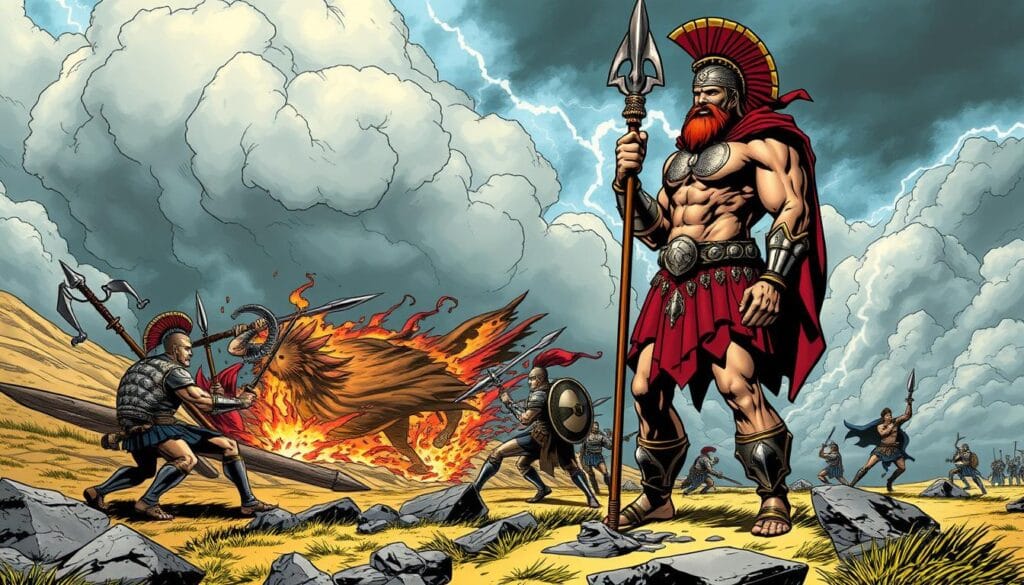
Modern Literary Interpretations
Today, authors see Ares with more depth and nuance. Modern novels explore his inner struggles and motivations. Rick Riordan has introduced him to young readers through engaging stories.
Poetry often uses his image to explore conflict and aggression. Academic works study his role in ancient Greek society and warfare. These interpretations go beyond simple good vs. evil.
Fantasy literature views him as a complex anti-hero. Authors explore what drives him to embody war. They question if violence can serve a greater purpose.
Comparing Literary and Artistic Depictions of Ares
Ancient literature and visual art offer complementary, yet distinct portraits of Ares. In the earliest stories, like those told by Homer and Hesiod, Ares is often described with striking imagery—towering, radiant in his armor, and exuding a fiery, intimidating presence. He rushes into battle, surrounded by fear and chaos, his very gaze likened to blazing fire. These vivid literary descriptions highlight his raw energy, unpredictability, and the terror he inspires not just among mortals, but even among the gods.
Artistic representations, meanwhile, bring Ares to life in a variety of dramatic scenes. On Greek pottery, he is typically shown in full battle regalia—shield, spear, and helmet—sometimes standing beside other gods or in moments of high drama, such as duels or feasts. Roman and later Greco-Roman works, from mosaics to statues, continue these themes, but often add elaborate detail to his armor and physique, emphasizing his strength, godly stature, and sometimes his connection to love and beauty through scenes with Aphrodite.
While literature often dwells on the aura of violence and fury that surrounds Ares, art captures both his martial prowess and his complex relationships. You’ll see him depicted both as an unstoppable force in chariot scenes or battles, and as a more vulnerable figure when paired with other deities. Renaissance painters later explored his emotional side too, immortalizing moments of tension and tenderness.
Together, these sources reveal a god who is both awe-inspiring and deeply flawed—a blend of brute force, vulnerability, and grandeur. Whether in the verses of epic poetry or the lines of a vase painting, artists and writers alike use Ares to ask big questions about conflict, power, and the dual nature of war.
The Duality of Ares: Violence vs. Valor
War has a dual nature that Ares perfectly shows in Greek mythology. This war deity stands at the crossroads of destruction and protection. Unlike other gods, Ares doesn’t just represent good or evil.
Academic sources call him “a fierce and bloodthirsty deity – both feared, and revered by the Ancient Greeks.” This shows how the Greeks saw war. They knew war could both destroy and protect.
Exploring the Complex Nature of War
Ares shows that war is both destructive and necessary. His character reflects the ancient view that war can create and destroy. Warriors called on him to protect their families and homeland.
The Greeks believed war was sometimes needed to defend justice and freedom. Ares showed them that courage and brutality often go together on the battlefield.
Yet, Ares also represented the savage side of war that people feared. His bloodlust reminded Greeks that war could destroy all that is good. This made him more realistic than gods who only showed war’s glory.
Ares as a Symbol of Fear and Respect
Warriors both called on Ares for courage and feared his influence. They knew his blessing could lead to victory or destruction. This paradox made soldiers respect the true nature of combat.
The war deity showed the thin line between bravery and violence. Greek soldiers knew that the same rage that made them brave could also make them cruel. Ares taught them that warfare needed both strength and wisdom.
His dual nature taught ancient Greeks to respect war’s power. Those who only saw the violent side faced terrible consequences. Those who ignored his influence were unprepared for the harsh realities of war.
The Consequences of Conflict in Mythology
Mythological stories show Ares’ influence often led to unnecessary casualties. His presence in battles often caused more destruction than needed. These tales warned about war’s true costs.
The stories involving Ares show violence breeds more violence. Conflicts he influenced rarely ended cleanly, creating new grievances and future wars. Ancient Greeks used these myths to understand the cycle of violence.
Through Ares, mythology taught that seeking peaceful solutions is better when possible. His stories reminded people that even necessary wars come with heavy prices. The battle deity showed that victory in conflict often feels hollow when measured against its human cost.
Ares in Popular Culture Today
The ancient Greek god Ares has found new life in today’s entertainment. Modern creators have turned this Olympian god into a complex character. They show him as more than just a bloodthirsty warrior.
These new versions of Ares make him relatable to today’s audiences. They understand the real costs of war. Creative works now present him as a tragic figure, shaped by the violence he represents.
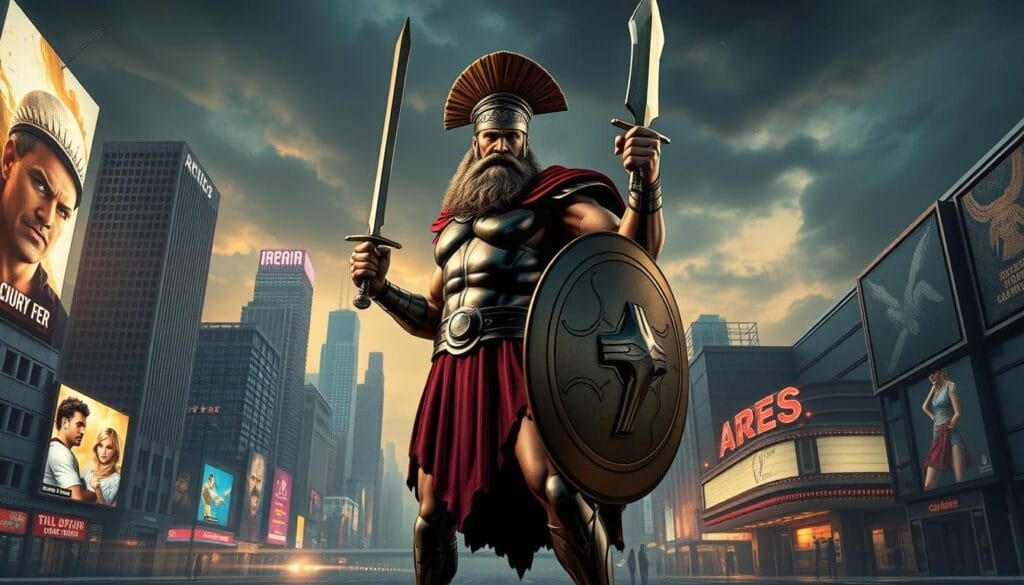
Movies and Television
Hollywood has made Ares a compelling antagonist in several major productions. The 2017 film Wonder Woman featured him as the primary villain, played by David Thewlis. This version showed Ares as a manipulative force, influencing human conflict from the shadows.
Television series have also given Ares memorable appearances. Hercules: The Legendary Journeys featured Kevin Smith as a recurring Ares character. The show explored his relationship with his half-brother Hercules and showed glimpses of vulnerability beneath his warrior exterior.
The popular YouTube series Destripando la Historia shows Ares’s enduring appeal. Their musical interpretation, inspired by Imagine Dragons’ “Warriors,” has reached millions of viewers. It has sparked renewed interest in Greek mythology among younger generations.
Video Games Featuring Ares
Interactive entertainment has provided some of the most compelling modern portrayals of Ares. The God of War franchise made him a central figure in Kratos’ story. Players witness his complex relationship with the protagonist and experience the consequences of divine warfare.
Assassin’s Creed Odyssey allows players to encounter Ares in ancient Greece. He appears as a formidable opponent with deep connections to the game’s mythology. The interactive format lets players explore his personality through dialogue and combat encounters.
The indie hit Hades presents a more sympathetic version of Ares as Zagreus’ uncle. This portrayal emphasizes family dynamics among the Olympian gods. It shows Ares as someone who genuinely cares about his nephew’s success, despite his warlike nature.
Comics and Graphic Novels
Comic book publishers have made Ares a recurring character in various mythological storylines. DC Comics features him prominently as one of Wonder Woman’s most persistent enemies. These stories often explore the philosophical conflict between Diana’s message of peace and Ares’ embodiment of war.
Marvel Comics has also utilized Ares in multiple storylines, sometimes as an antagonist and other times as an unlikely ally. Their version often struggles with his nature as a god of war in a modern world that has moved beyond ancient conflicts.
Independent publishers have created innovative interpretations of Ares in graphic novels. These works reimagine Greek mythology for contemporary readers. They frequently focus on the psychological toll of constant warfare and the isolation that comes with being feared.
| Media Type | Notable Examples | Character Portrayal | Key Themes |
|---|---|---|---|
| Movies | Wonder Woman, Immortals | Manipulative antagonist | Hidden influence, corruption |
| Television | Hercules series, Xena | Complex family member | Sibling rivalry, redemption |
| Video Games | God of War, Hades | Mentor turned enemy | Betrayal, divine politics |
| Comics | DC Wonder Woman, Marvel | Philosophical opponent | War versus peace ideology |
These modern interpretations have successfully transformed Ares from a one-dimensional war god into a character that resonates with contemporary audiences. By exploring themes of trauma, family dysfunction, and the moral complexity of conflict, creators have made this ancient deity relevant to modern storytelling. The evolution of his character reflects our own changing relationship with war and violence in the 21st century.
Lessons from Ares: War and Its Implications
The stories of Ares teach us about conflict and human nature. Greek mythology shows him as both a destroyer and a protector. This teaches us about the role of force in society.
Understanding War through Mythology
Ares symbolism teaches us about warfare and aggression. His myths highlight the difference between defense and destructive violence. The ancient Greeks used these stories to explore military ethics and combat psychology.
Today, we can apply these lessons to understand when conflict is necessary. And when it becomes harmful.
The Legacy of Ares in Modern Society
Academic sources ask why Ares wasn’t more central to Greek worship. Despite warfare defining ancient society, his influence was limited. This shows deeper cultural attitudes toward conflict.
Today, his influence is seen in military traditions and support for veterans. His dual nature reflects debates about military intervention and maintaining peace.
Reflection on Conflict and Peace
Ares teaches us that true strength is not just in fighting. It’s in knowing when to fight. His stories guide us in personal disputes and international relations.
Greek mythology reminds us to understand our aggressive impulses. This is the first step toward controlling them and building peace.
